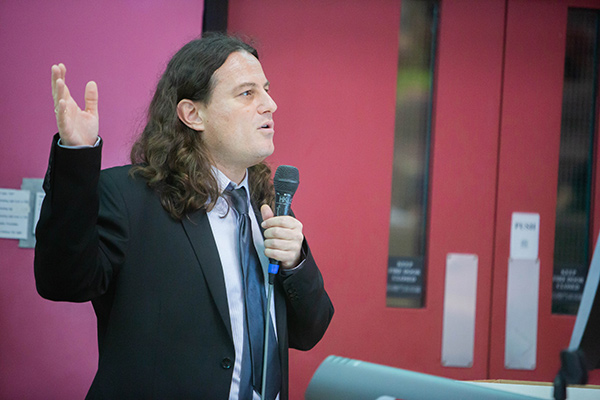Artificial Intelligence Seminar Series
Detecting "Fake News" at Their Source
07 Nov 2018 (Wed)
3:00pm - 4:00pm
Cheung On Tak Lecture Theater (LT-E), 1/F, Academic Building, HKUST
Speaker: Dr. Preslav Nakov
Abstract
Given the recent proliferation of disinformation online, there has been also growing research interest in automatically debunking rumors, false claims, and fake news. A number of fact-checking initiatives have been launched, both manual and automatic, but the whole enterprise remains in a state of crisis: by the time a claim is finally fact-checked, it could reach millions of users, and the harm caused could hardly be undone. We believe that a more promising direction is to focus on the source instead: if a news outlet has been spreading "fake news" in the past, it is likely to do so in the future. In particular, we build media profiles, which give users information about whether one should believe a given piece of news or should take it with a grain of salt. We further uncover the leading political ideology of the target source: Is it centric/neutral, is it leaning left/right, is it hyper-partisan? At the individual news article level, we focus on propaganda and stance detection, and we further predict which claims in an article should be prioritized for fact-checking.
This research is developed in collaboration between QCRI and MIT, and it got a lot of recent media attention, e.g., by Forbes, MIT Technology Review, Boston Globe, Fast Company, Popular Science, The Register, Sina, HiNet, etc.
Speaker Biography
Dr. Preslav Nakov is a Senior Scientist at the Qatar Computing Research Institute, HBKU. His research interests include computational linguistics and natural language processing, machine translation, question answering, fact-checking, sentiment analysis, lexical semantics, Web as a corpus, and biomedical text processing. He is the PI of the QCRI mega-project Tanbih whose aim is to develop a news aggregator that limits the effect of fake news, propaganda and media bias by helping users step out of their bubble and achieve a healthy news diet (2017-present). He is also the lead-PI of a QCRI-MIT collaboration project on Arabic Speech and Language Processing for Cross-Language Information Search and Fact Verification (co-PI, 2016-2018; Lead-PI, 2018-present), and he was a co-PI of another QCRI-MIT collaboration project on Speech and Language Processing for Arabic (2013-2016).
Preslav Nakov co-authored a Morgan & Claypool book on Semantic Relations between Nominals, two books on computer algorithms, and many research papers in top-tier conferences and journals. He received the Young Researcher Award at RANLP'2011. He was also the first to receive the Bulgarian President's John Atanasoff award, named after the inventor of the first automatic electronic digital computer. He is Secretary of ACL SIGLEX, the Special Interest Group (SIG) on the Lexicon of the Association for Computational Linguistics (ACL). He is also Secretary of SIGSLAV, the ACL SIG on Slavic Natural Language Processing. He is an Action Editor of the Transactions of the Association for Computational Linguistics (TACL) journal, a Member of the Editorial Board of the Journal of Natural Language Engineering, an Associate Editor of the AI Communications journal, and Editorial Board member of the Language Science Press Book Series on Phraseology and Multiword Expressions. He served on the program committees of the major conferences and workshops in Computational Linguistics, including as a co-organizer and as an area/publication/tutorial/shared task chair, Senior PC member, student faculty advisor, etc.; he co-chaired SemEval 2014-2016 and was an area co-chair of ACL, EMNLP, NAACL-HLT, and *SEM, a Senior PC member of AAAI and IJCAI, a shared task co-chair of IJCNLP, and a tutorial chair of ACL.
Preslav Nakov received his PhD degree in Computer Science from the University of California at Berkeley (supported by a Fulbright grant and a UC Berkeley fellowship), and a MSc degree from the Sofia University. He was a Research Fellow at the National University of Singapore, a honorary lecturer in the Sofia University, and a research staff in the Bulgarian Academy of Sciences.

